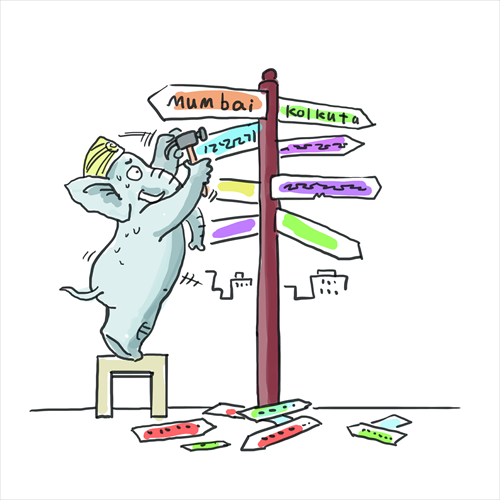British names woven into India’s fabric

Illustration: Liu Rui/GT
"Bombay" has become Mumbai, "Calcutta" Kolkuta, and "Madras" Chennai. A vogue for putting colonial names back into an "Indian" form has swept India in recent years, with one member of the parliament even demanding that India should be renamed "Bharat," after its Hindi name.
The European-colonial renaming controversy hinges on cultural-regional-national paranoia. It survives even as more Indians speak English today than ever before and every second signboard on Indian roads invariably adopts English.
The renaming of many colonial roads and places was carried out in the initial years just after independence as many Indians found retaining colonial names, symbols and relics a reminder of the British rule. Many names survived, though there were violent protests in some areas over the issue, especially in the 1960s.
India may have undergone more renaming and respelling than anywhere else. The renaming spree continues as India's many regional, local, caste and other identities emerge. I, like other Indians, have gotten confused about the names of cities, roads, railway stations, hospitals, museums, schools or universities, especially when they've shifted since our childhood.
British names are a tempting target for vote-hungry politicians. It's easier to rename a rickety road than to put the effort into fixing it.
Common Indians remain fairly, even strongly divided about changing of colonial names. Six decades after independence, they have simply got used to colonial names, and many have fond memories and little animosity toward the British rule in India. They see the British as a force that not only united the country politically but brought modernity and the rule of law over conservative feudal, caste and regional identities.
The renaming of roads has often come from underperforming governments and ministers. Unsurprisingly, most see renaming more as a political gimmick to serve parochial agendas.
Nearly a decade ago, in India's Silicon Valley city of Bangalore, the renaming of many a road was criticized as an attempt by local politicians to divert attention from their poor governance and developmental achievements.
The author of several books on Bangalore, T.P. Issar, wrote that to rename Miller Road was an insult to history, as it was named after Miller's [water] tanks that had saved the city from drought.
In April this year, an NGO Praja Foundation said in its performance assessment report of the Mumbai municipality that its 227 staff asked 127 questions on the renaming of roads and junctions in the city corporation meetings. But they asked barely 100 questions about potholes, pathetic roads, garbage collection, water supply and so on, despite nearly 34,000 complaints from the public.
Some cities have shown a greater conscience about changing names. In 2010, when Chennai planned changing as many as 50 colonial era road names, there was public unanimity that names of those who contributed to the Indian society should continue.
Ellis Road was not renamed because it was named after Francis Whyte Ellis, a widely respected scholar of Tamil, the local language, and translator of the Thirukkural, the most important Tamil text, into English. The renaming of Norton Road was also opposed, as Eardley Norton was one of the founders of the Indian National Congress that led India to independence.
Renowned Indian author R.K. Narayan talks in the story "Lawley Road" in his short story collection, Malgudi Days, of how such renaming brings complications, often chaos. Narayan writes, "the town became a wilderness with all its landmarks gone."
Another iconic take on renaming came in 2002 from diplomat and politician Shashi Tharoor: "The weather will be just as sultry in Chennai as it used to be in Madras. But are we Indians so insecure in our independence that we still need to prove to ourselves that we are free?"
The author is a doctoral researcher on Chinese media at the Centre for East Asian Studies, School of International Studies, Jawaharlal Nehru University, New Delhi. tilakjha@gmail.com